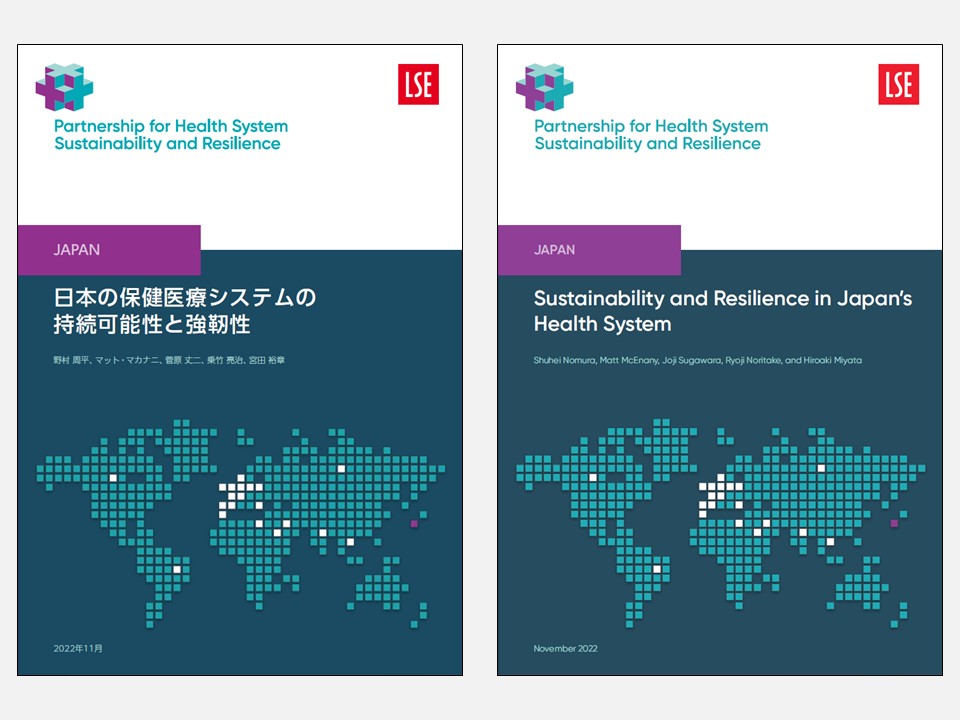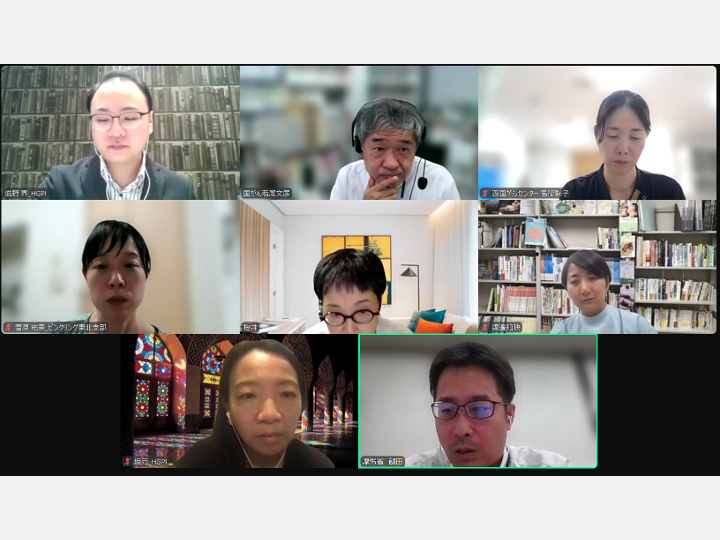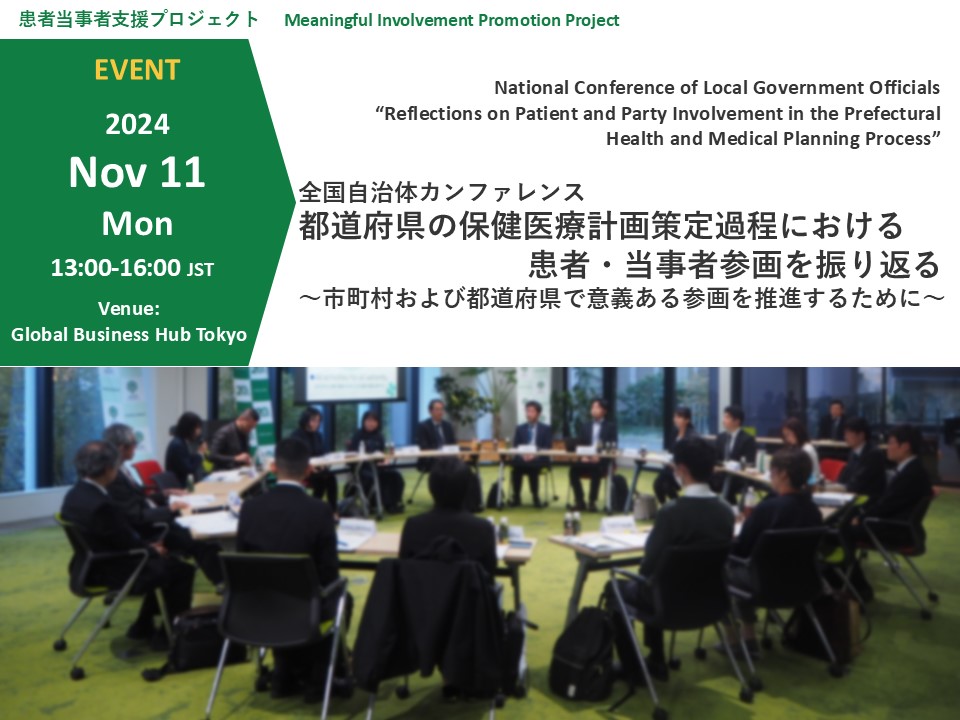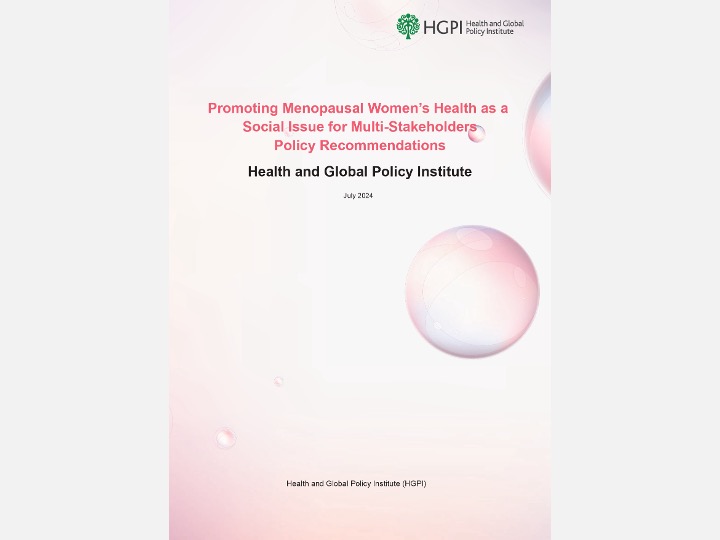[Policy Recommendations] Cancer Control Project “Policy Recommendations on Addressing Regional Disparities in Breast Cancer Care” (January 31, 2025)
![[Policy Recommendations] Cancer Control Project “Policy Recommendations on Addressing Regional Disparities in Breast Cancer Care” (January 31, 2025)](https://hgpi.org/en/wp-content/uploads/sites/2/Policy-Recommendations-on-Addressing-Regional-Disparities-in-Breast-Cancer-Care-top.jpg)
The English version of the report has been published. (March 28, 2025)
Health and Global Policy Institute (HGPI) has presented a policy recommendation titled, “Policy Recommendations on Addressing Regional Disparities in Breast Cancer Care.” This report focuses on addressing regional disparities in breast cancer care by analyzing issues in Japan’s current healthcare system and identifying the challenges unique to breast cancer. It proposes policy measures that not only address for breast cancer but that are generalizable to other types of cancer, and that address healthcare disparities.
To identify the challenges in regional disparities in breast cancer care, we conducted both qualitative and quantitative surveys. Qualitative surveys involved interviews and literature reviews targeting healthcare professionals, breast cancer patients, and policymakers, and included evaluations of indicators used in quantitative studies. Quantitative surveys, informed by qualitative findings, identified indicators to capture regional disparities. Data were collected from various public statistics and measured at the prefectural level. The results revealed regional disparities in breast cancer care across four domains:
- Multidisciplinary treatment based on the latest evidence.
- Emerging advanced medical care (e.g., personalized medicine, clinical trials).
- Treatment options and medical support associated with breast cancer care (e.g., fertility preservation, appearance care, breast reconstruction).
- Social support, including employment-related support for breast cancer patients.
To address regional disparities in breast cancer care, discussions among experts centered on three key perspectives: Sustainable healthcare delivery systems, Implementation of the PDCA cycle for quality improvement, and Patient participation and comprehensive support.
◼︎ Overview of the recommendation
Sustainable Healthcare Delivery Systems Adapted to Regional Needs
1. Accelerating Functional Differentiation and Coordination among Medical Facilities (“Hub-and-Spoke Model”):
2. Leveraging Digital Technologies:
The national government should provide a general vision, that will help prefectures and Prefectural Cancer Treatment Coordination Councils to lead discussions to centralize certain functions and build close cooperation among institutions tailored to regional needs.
Digital solutions such as telemedicine and workflow efficiency enhancements should be promoted through financial incentives provided by the national and prefectural governments to address geographical and personnel limitations.3. Advancing Systematic Initiatives for Specialist Personnel Deployment and Task Sharing:
4. Creating Environments for Learning and Applying Specialized Knowledge:
Policies supporting the training and employment of diverse specialists involved in breast cancer care should be promoted, including discussions on efficient role-sharing to facilitate effective team-based care.
Collaborative efforts among the government, professional organizations, and academic societies should establish well-organized and practical training programs, supported by ICT, to ensure knowledge acquisition and provide opportunities for personnel to utilize and be recognized for their expertise.
Visualization and Improvement of Medical Quality through Data Utilization (PDCA Cycle)
1. Ensuring early Execution of PDCA Cycles Based on Data:
Strengthen systems to analyze and improve the quality of breast cancer care using objective data across national, prefectural, and institutional levels.2. Building a Foundation for Objective and Comparable Data Utilization:
Enhance database integration to leverage existing high-quality data sources (e.g., National Clinical Database) for assessing and improving cancer care quality.
Patient Participation and Comprehensive Social and Economic Support
1. Enhancing the frequency and quality of communication between patients and healthcare providers through maximum use of existing resources:
By combining consultation services, introducing online consultations, and strengthening the promotion of consultation services, improve the efficiency of existing resources to enhance communication between patients and healthcare providers. This will support patients in actively receiving treatment and other necessary care and support based on their specific conditions.2. Promoting discussions aimed at rectifying regional disparities and strengthening access to social and economic support:
Visualize existing supporting frameworks, such as national support systems or region-specific subsidies, to ensure that individuals receive the necessary support at the right time based on the stage of the disease or life course. Additionally, discuss potential improvements (“raising the baseline”) for support systems where disparities exist due to patients’ attributes, such as geographical location, workplace characteristics, employment type, or age etc.3. Fostering public understanding of regional healthcare systems and coordination:
Expand and reinforce educational opportunities, such as public seminars, to help patients actively learn about their health and medical care. Encourage meaningful consultations with healthcare professionals and enable informed choices of healthcare institutions. Furthermore, ensure clear and accessible information is made available regarding the local breast cancer care delivery system.
It is strongly hoped that this proposal will contribute to further advancing patient-centered care and establishing breast cancer or cancer care as a whole in the future.
Top Research & Recommendations Posts
- [Policy Recommendations] The Path to a Sustainable Healthcare System: Three Key Objectives for Public Deliberation (January 22, 2026)
- [Research Report] Perceptions, Knowledge, Actions and Perspectives of Healthcare Organizations in Japan in Relation to Climate Change and Health: A Cross-Sectional Study (November 13, 2025)
- [Research Report] The 2025 Public Opinion Survey on Healthcare in Japan (March 17, 2025)
- [Policy Recommendations] Reshaping Japan’s Immunization Policy for Life Course Coverage and Vaccine Equity: Challenges and Prospects for an Era of Prevention and Health Promotion (April 25, 2025)
- [Research Report] The 2023 Public Opinion Survey on Satisfaction in Healthcare in Japan and Healthcare Applications of Generative AI (January 11, 2024)
- [Research Report] AMR Policy Update #4: Cancer Care and AMR (Part 1)
- [Policy Recommendations] Developing a National Health and Climate Strategy for Japan (June 26, 2024)
- [Public Comment Submission] “Assessment Report on Climate Change Impacts in Japan (Draft Overview)” (December 24, 2025)
- [Research Report] Survey of Japanese Physicians Regarding Climate Change and Health (December 3, 2023)
- [Research Report] The Public Opinion Survey on Child-Rearing in Modern Japan (Final Report) (March 4, 2022)
Featured Posts
-
2026-01-09
[Registration Open] (Hybrid Format) Dementia Project FY2025 Initiative Concluding Symposium “The Future of Dementia Policy Surrounding Families and Others Who Care for People with Dementia” (March 9, 2026)
![[Registration Open] (Hybrid Format) Dementia Project FY2025 Initiative Concluding Symposium “The Future of Dementia Policy Surrounding Families and Others Who Care for People with Dementia” (March 9, 2026)](https://hgpi.org/en/wp-content/uploads/sites/2/dementia-20260309-top.png)
-
2026-02-05
[Registration Open] (Webinar) The 141st HGPI Seminar “Current Status and Future Prospects of Korea’s Obesity Policy: Voices of People with Lived Experience in Policy Promotion” (March 3, 2026)
![[Registration Open] (Webinar) The 141st HGPI Seminar “Current Status and Future Prospects of Korea’s Obesity Policy: Voices of People with Lived Experience in Policy Promotion” (March 3, 2026)](https://hgpi.org/en/wp-content/uploads/sites/2/hs141-top-1.png)
-
2026-02-06
[Research Report] AMR Policy Update #5: Cancer Care and AMR (Part 2)
![[Research Report] AMR Policy Update #5: Cancer Care and AMR (Part 2)](https://hgpi.org/en/wp-content/uploads/sites/2/HGPI_20260204_AMR-Policy-Update-5.png)











